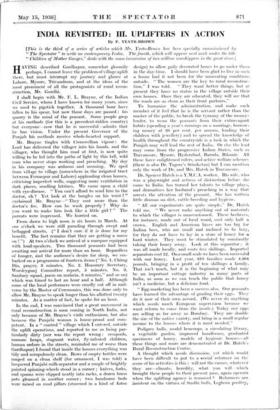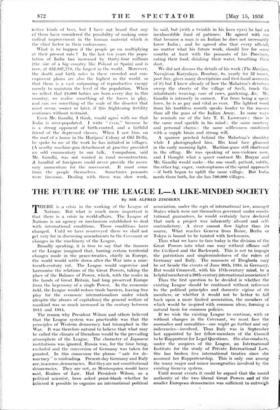INDIA REVISITED: III. UTUFTERS IN ACTION
By F. YEATS-BROWN
(This is the third of a series • of articles which Mr. Yeats-Brown has been specially commissioned- by " The Spectator " to write on contemporary India. The fourth, which will appear next week under the title " Children of Mother Ganges," deals with the mass immersion of two million worshippers in the great river.] AVING described Gardhapur, somewhat gloomily Al perhaps, I cannot leave the problem of village uplift there, but must interrupt my journey and glance at Lahore, Mysore, Trivandrum, and at the ideas of the most prominent of all the protagonists of rural recon- struction, Mr. Gandhi.
I shall. begin with Mr. F. L. Brayne, of the Indian Civil Service, whom I have known for many years, since we used to pigstick together. A thousand boar have fallen to his spear, but now those days are passed : his quarry is the mind of the peasant. Some people gasp at his methods (for this is a precedent-ridden country) but everyone—now that he is successful—admits that he has vision. Under the present Governor of the Punjab his methods receive whole-hearted support.
Mr. Brayne tingles with Cromwellian vigour : the Lord has delivered the villager into his hands, and the villager, who thought him mad at first, is now quite willing to be led into the paths of light by this tall, wild man who never stops working and preaching. My day in his company was arduous and amusing. We sped from village: to village (somewhere in the irrigated tract between Ferozepur and Lahore) applauding clean houses, criticising imperfect wells, suggesting more ventilation in dark places, smelling latrines. We came upon a child with eye-disease. " You can't afford to send him to the doctor, eh ? Yet look at the bangles on his wrist 1 " exclaimed Mr. Brayne—" They cost more than the doctor's fee. How can he wash properly ? Why do you want to make him look like a little girl ? " The parents were impressed. We hurried on.
From dawn to high noon is six hours in March. At one o'clock we were still parading through swept and beflagged streets. (" I don't care if it is done for my benefit. The fact remains that they are getting a move on ! ") At two o'clock we arrived at a marquee equipped with loud-speakers. Two thousand peasants had been awaiting our arrival for more than an hour. Regardless of hunger, and the audience's desire for sleep, we em- barked on a programme of fourteen items ("No. 1. Chirag Din, prayer, 8 minutes. No. 2. Honorary Secretary, Worsleygunj Committee report, 5 minutes. No. 8.
Sanitary squad, poem on malaria, 3 minutes," and so on) which was timed to last an hour and a half. Although some of the local performers were cruelly cut off in mid- verse by the Master of Ceremonies, this was done only to allow Mr. Brayne to speak longer than his allotted twenty minutes. As a matter of fact, he spoke for an hour.
In the end, I was convinced that a great movement in rural reconstruction is soon coming in North India, not only because of Mr. Brayne's virile enthusiasm, but also because the Punjabi woman is house-proud and com- petent. In a " control " village which I entered, outside the uplift operations, and reported to me as being par- ticularly dirty (nor was the report wrong : cesspools, manure heaps, stagnant water, fly-infested children, human ordure in the streets, reminded me of worse than Gardhapur) I found that inside the houses everything was tidy and scrupulously clean. Rows of empty bottles were ranged on a clean shelf (for ornament, I was told) a lacquered Punjabi milk-separator and a couple of brightly painted spinning-wheels stood in a corner ; knives, forks, and spoons were clipped neatly into racks, a dozen brass pots gleamed in another corner ; two handsome beds were raised on mud pillars (stuccoed in a kind of Aztec design) to allow gaily decorated boxes to go under them in the day-time. I should have been glad to live in such a house had it not been for the nauseating conditions outside. " The women are the key to rural reconstruc- tion," I was told. " They want better things, but at.
present they have no status in the village outside their own houses. Once they are educated, they will see that the roads are as clean as their front parlours."
To humanise the administration, and make each member of it feel that he is the servant rather than the master of the public, to break the tyranny of the money- lender, to wean the peasants from their extravagant habits (spending a year's earnings on a marriage, borrow- ing money at 36 per cent. per annum, loading their children with jewellery) and to spread the knowledge of health throughout the countryside is a task in which the Punjab may well lead the rest of India. Or else the lead may come from the progressive Indian States, such as Travancore, Mysore, Hyderabad, Baroda, Bikanir. All these have enlightened rulers, and active welfare schemes (there is also Dr. Tagore's Sriniketan) but I can mention only the work of Dr. and Mrs. Hatch in Travancore.
Dr. Spencer Hatch is a Y.M.C.A. worker. His wife, who was a playwright and actress of distinction before she came to India, has turned her talents to village plays, and dramatises her husband's preaching in a way that arrests the attention of the peasant. She has written little dramas on diet, cattle-breeding and hygiene.
" All our experiments arc quite simple," Dr. Hatch told me. " We never make anything out of materials to which the villager is unaccustomed. These beehives, for instance, made out of local wood, cost only half a crown. English and American hives are too big for Indian bees, who are small and inclined to be lazy, for they do not have to lay in a store of honey for a hard winter. They must be stimulated by constantly taking their honey away. Look at this separator : it was all made locally, and costs five shillings. Imported separators cost £2. On a small scale we have been successful with our honey. Last year, 819 families made 4,804 pounds, bringing in a profit of ten shillings a family. That isn't much, but it is the beginning of what may be an important cottage industry in many parts of India, as soon as we can teach the public that honey isn't a medicine, but a delicious food.
" Egg-marketing has been a success also. Our peasants have learned the advantage of grading their eggs. They do it now of their own accord. (We never do anything which needs much European supervision because we want reform to come from the inside.) Today our eggs are selling as far away as Bombay. They are double the size of the native variety, and bring in a small regular income to the houses where it is most needed."
Pedigree bulls, model hencoops, a circulating library, a vegetable garden, improved handlooms, graduated specimens of honey, models of hygienic houses—all these things and more are demonstrated at Dr. Hatch's Rural Reconstruction Centre.
A thought which needs discussion, yet which would have been difficult to put to a social reformer on the scene of his activities is this : will not the causes, whatever they are—climate, heredity, what, you will—which brought these people to their present pass, again operate when the uplifting agency- is removed ? Reformers are insistent on the virtues of Sindhi bulls, Leghorn poultry, active kinds of bees, but I have not heard that any -of them have considered the possibility of making some radical improvement in the human material which is the chief factor in their endeavours.
What is to happen if the people go on multiplying at their present rate ? In the last ten years the popu- lation of. India has increased by thirty-four millions (the size of a big country like Poland or Spain) and is now, at 352,887,778, the largest in the world. Moreover, the death and birth rates in these crowded and con- cupiscent plains are also the highest in the world, so that there is a vast outpouring of reproductive energy merely to maintain the level of the population. • When we reflect that 24,000 babies are born every day in this country, we realise something of the forces in play, and can see something of the scale of the disaster that must occur, sooner or later, if this frightening fertility continues without restraint.
Even Mr. Gandhi, I think, would agree with me that India is over-populated. I write " even," because he is a strong opponent of birth-control, and a faithful friend of the depressed classes. When I saw him, on the roof of a house in the Harijans' Colony at Old Delhi, he spoke to me of the work he has initiated in villages. (A nearby machine-gun detachment at practice provided an odd commentary to our talk. Compulsion, said Mr. Gandhi, was not wanted in rural reconstruction. A handful of foreigners could never provide the neces- sary momentum for the movement. It must come from the people themselves. Sometimes peasants were tiresome. Dealing with them was slow work, he said, but (with a twinkle in his keen eyes) he had an inexhaustible fund of patience. He agreed with me that because a man is an Indian he does not necessarily know India ; and he agreed also that every official, no matter what his future work, should live for some months at least with the peasants of his Province, eating their food, drinking their water, breathing their dust.
We did not discuss the details of his work (The Harijan, Navajivan Karyalaya, Bombay, 8s. yearly for 52 issues, post free, gives many descriptions and first-hand accounts of it) but I knew already of how the Mahatma's devotees sweep the streets of the -village of Savli, teach the inhabitants weaving, care of cows, gardening, &c. Mr. Gandhi is intensely in earnest. Far from being a spent force, he is as gay and vital as ever. The lightest word from his toothless mouth speaks louder to the masses than all the guns of the Indian Army. In some ways he reminds me of the late T. E. Lawrence : there is the same cool sparkle in his mind : the same courtesy and personal charm : the same selflessness combined with a supple brain and strong will.
A sparrow perched behind the Mahatma's shoulder while I photographed him. His kind face gleamed in the early morning light. Machine-guns still chattered in the offing. He was speaking of non-violence now, and I thought what a queer contrast Mr. Brayne and Mr. Gandhi would make—the one small, patient, subtle, the other big, eager, contemptuous of the spiral approach —if both began to uplift the same village. But India needs them both, for she has 700,000 villages.























































 Previous page
Previous page